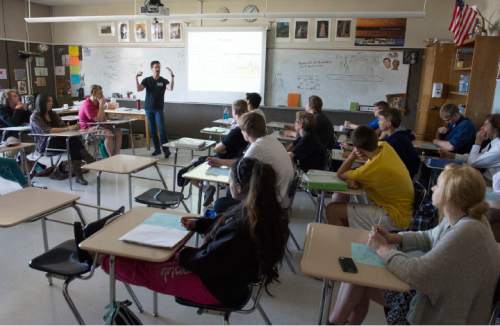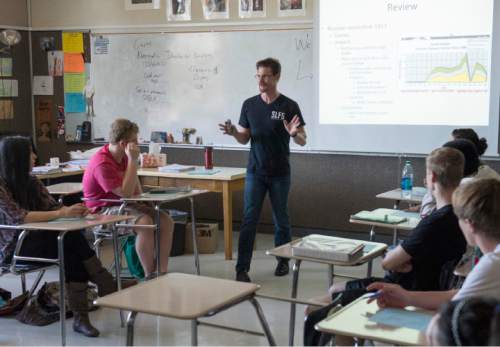This is an archived article that was published on sltrib.com in 2015, and information in the article may be outdated. It is provided only for personal research purposes and may not be reprinted.
The state school board will not ask Gov. Gary Herbert to veto legislation that revises significant chunks of Utah's education laws.
Initially worried a bill passed in the final days of the 2015 Legislature could threaten any national or federal education programs lawmakers decide they don't like — including Advanced Placement and International Baccalaureate programs and ACT tests — education managers scheduled a special meeting and were prepared to ask the governor to dimiss the measure.
But after the draft law's sponsor, Draper Republican Rep. LaVar Christensen, met with the board Thursday, school board members reconsidered.
"I don't see that there's any problem continuing those programs," said board chairman David Crandall.
Board members met Thursday in an atypical meeting for the sole purpose of discussing HB360.
Crandall said his colleagues were most concerned about changing the separation of powers between the Legislature and elected school board members. Christensen's legislation gives lawmakers more review and approval authority over education policy and programs.
Those worries remain, Crandall said, but Christensen promised he would continue to work with education managers to simplify language in Utah code about public schools.
"If you look at the code before the bill came out, it wasn't pretty then either," Crandall said. "This is kind of a first step, I think, in a long journey."
Among the bill's provisions is one to remove six non-voting members of the state school board, who traditionally advise board members from the perspective of higher education, minority groups and charter schools.
The bill also would require the state school board to prepare a 10-year education plan, remove all references to a statewide curriculum and direct the Legislature to review national and federal education programs that cost more than $1 million.
That provision led to some debate among the board and lawmakers about whether the state school board would have authority to approve advanced curriculum programs or college-entrance exams, all of which originate outside the state.
Christensen's co-sponsor, Orem Republican Sen. Margaret Dayton, was part of an effort in 2008 to defund International Baccaleureate in Utah. The program offers high school students college credit through rigorous, internationally-focused courses that Dayton criticized for being unpatriotic.
"I'm not opposed to understanding the world," she said then. "I'm opposed to the anti-American philosphy that's somehow woven into all the classes as they promote the [United Nation's] agenda."
During Thursday's meeting, Christensen said he'd be willing to sponsor future bills to clean up unintended consequences from HB360, and to carve out specific protections for programs favored by the school board.
"We can put an explicit exception for any of those that you want," he said. "I'm happy to do it."
The Utah Constitution gives the state school board general control and supervision over public education in the state. But Christensen maintained Thursday that his 62-page bill giving lawmakers more authority to set policy and choose curriculum is not in conflict with that constitutional mandate.
Christensen sponsored Utah's Amendment 3, which defined marriage as between a man and a woman and was declared unconstitutional in December 2013. And a religious liberty bill he drafted stalled at the Legislature this year due in part to concerns about unconstitutionality.
Christensen said his intention with HB360 was not to reduce the power of the school board, but to foster collaboration between educators and lawmakers. He emphasized that the bill does not require additional legislative oversight of public education. Instead, Christensen said, the legislation is a "huge vote of confidence" for the state school board.
"I really think we're on the right track where this is very unifying and not divisive at all," he said. "To not embrace this bill would be a catastrophic step backwards."
But some board members still are worried about the bill, despite Christensen's reassurances.
Linda Hansen said it would have been better to clean up the bill's language before it was passed by the Legislature, rather than consider a potential veto request or explore fixes in future legislation.
"I kind of wish we would have seen you before," she said.
And board member Leslie Castle said she objected to the bill, but would not push a veto in hopes that Christensen will maintain an open line of communication with the board. She said too many lawmakers renege on compromises, relying on future amendments that never materialize.
"We make concessions based on promises ... then they're not fixed," she said. "I think you are willing to work with us."
In the end, the board adjourned without taking any action on Christensen's bill.
After the meeting, Crandall said he did not anticipate future veto requests from the board on HB360 or other education-related legislation.
Marty Carpenter, Herbert's spokesman, said the Governor's Office is reviewing 2015 bills for potential vetoes and declined to comment.















